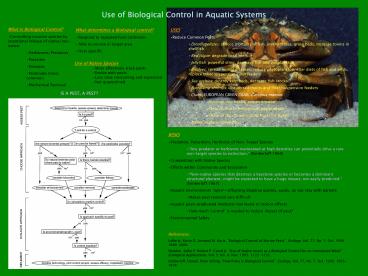Use of Biological Control in Aquatic Systems
1 / 1
Title:
Use of Biological Control in Aquatic Systems
Description:
Use of Biological Control in Aquatic Systems. What is Biological Control? ... Red Algae: degrade coral reefs. Jellyfish: powerful sting, decrease fish and zooplankton ... –
Number of Views:36
Avg rating:3.0/5.0
Title: Use of Biological Control in Aquatic Systems
1
Use of Biological Control in Aquatic Systems
- What is Biological Control?
- Controlling invasive species by intentional
release of native/non-native - Herbivores/Predators
- Parasites
- Diseases
- Pesticides (most common)
- Mechanical Removal
- USES
- Reduce Common Pests
- Dinoflagellates reduce mortality of fish,
invertebrates, grass beds, increase toxins in
shellfish - Red Algae degrade coral reefs
- Jellyfish powerful sting, decrease fish and
zooplankton - Bivalves spread mortal diseases, reduce
phytoplankton, alter diets of fish and birds,
replace other suspension/filter feeders - Sea urchins destroy kelp beds, decrease fish
stocks - Burrowing shrimps disturb sediments and
filter/suspension feeders - Crabs EUROPEAN GREEN CRAB, Carcinus maenas
- Burrows into banks, causes erosion
- Only control is Nermertean egg predator
- Other crabs (China) can be hosts for flukes
- Fishes replace native fish
- What determines a Biological control?
- Respond to repeated host outbreaks
- Able to survive in target area
- Host specific
- Use of Native Species
- More effectively track pests
- Evolve with pests
- Less time consuming and expensive
- Not quarentined
IS A PEST, A PEST?
- RISKS
- Predation, Parasitism, Herbivory of Non-Target
Species - Any predator or herbivore maintained at high
densities can potentially drive a rare non-target
species to extinction. (Simberloff 1966) - Competition with Native Species
- Effects within Community and Ecosystem
- Non-native species that destroys a keystone
species or becomes a dominant structural element,
might be expected to have a huge impact, not
easily predicted. (Simberloff 1967) - Aquatic environments openoffspring disperse
quickly, easily, do not stay with parents - Makes pest removal very difficult
- Aquatic pests eradicated modestly/low levels to
reduce effects - How much control is needed to reduce impact of
pest? - Environmental Safety
References Lafferty, Kevin D, Armand M. Kuris.
Biological Control of Marine Pests. Ecology,
Vol. 77, No. 7. Oct, 1996. 1989-2000. Sheldon,
Sallie P, Robert P. Creed Jr. Use of Native
Insect as a Biological Control for an Introduced
Weed. Ecological Applications, Vol. 5, No. 4.
Nov, 1995. 1122-1132. Simberloff, Daniel, Peter
Stiling. How Risky is Biological Control.
Ecology, Vol. 77, No. 7. Oct, 1996. 1965-1974.































